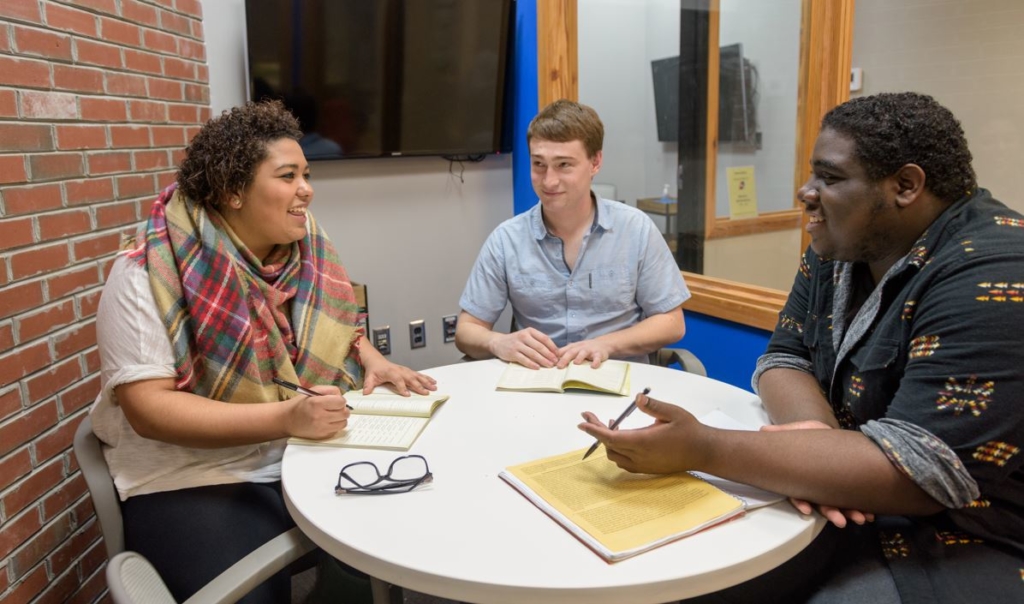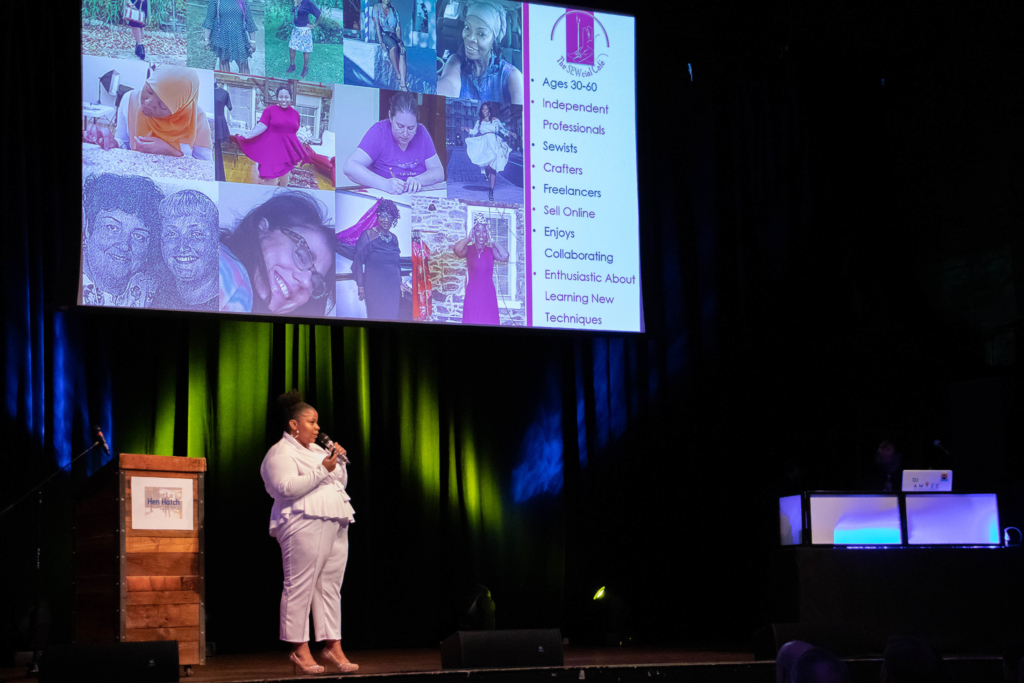
UD students collaborate in the Horn Venture Development Center. (Courtesy photo)
UNDERGRAD ENTREPRENEURSHIP MAJOR
Horn’s undergraduate entrepreneurship major is still located under the business college umbrella. It is purposely small – about 30 students per class – and cohort based to help students make connections. Horn majors dive right into experiential learning, and they take Intro to Entrepreneurship in their first semester. Ignite!, an early move-in program, focuses on team building, networking, mindfulness and community building.
Students go through a year-long professional development sequence together, and an internship coordinator provides students with ongoing support and mentorship, working with companies to provide students a real entrepreneurial experience.
Students take required general, liberal arts classes, as well as the suite of business basics such as intro to management, finance, marketing, etc. There’s a core entrepreneurship curriculum around creative problem solving which includes required leadership courses as well as electives in topics like startup experience, entrepreneurial marketing, and others.
Finally, there are technical competency classes, a set of five or more classes in a focused area of the students’ interest. That could be real estate, biomedical engineering, computer science or a number of others. Students can either choose existing minors or customize their own path.

Jason Bangser
Bangser, who recently graduated with double majors in Marketing and Entrepreneurship & Technology Innovation, founded and is developing his startup, ShareWallet, as a Horn major. The social platform allows friends to earn rewards together by using company referral programs, and it was the biggest startup winner in the pre-revenue track at Hen Hatch 2021, UD’s annual pitch competition.
“Horn made every resource I needed for my startup’s journey unbelievably accessible: knowledge, talent, funds, and even time. I never once felt unsupported, and it’s an amazing feeling knowing that, since there’s so much value at my disposal, the only potential limiting factor in my startup’s success is myself. I also know that, as a Horn alumni, I still have nearly all the same resources available to me,” Bangser tells Poets&Quants.
He discovered the Horn Program while researching University of Delaware and played a huge part in his decision to attend UD.
“No other university I was considering, even the huge ones, had a program quite like it. I couldn’t picture myself pursuing an entrepreneurial journey anywhere else,” he says.
HORN VENTURE DEVELOPMENT CENTER
Another distinguishing factor for Horn is that it controls both the Venture Development Center and the academic program, intentionally designed to work together.
The 5,000-square-foot center is home to the university’s entrepreneurial community. There, students have access to tools for Design Thinking, pitch parties, workshops and entrepreneurial clubs, and Free Lunch Fridays – a weekly speaker series featuring experienced entrepreneurs. The center also hosts startup funding competitions, such as Hen Hatch and Startup 302, an early-stage startup funding competition, specifically focused on founders from historically underrepresented backgrounds.
Since its founding, Horn student and alumni ventures have secured more than $7.4 million in funding. These include Carvertise, an advertising company that wraps cars of high-mileage rideshare drivers in mobile billboards, launched in 2012 by UD engineering undergrads Mac Nagaswami and Greg Star. Alchemize Fightwear, “fightwear for the fierce female,” was founded by 2020 alum Maya Nazareth who became frustrated by grappling gear for women. Two Horn teams have also been accepted into Y Combinator, Silicon Valley’s most prominent and longest standing venture accelerators. One of those, Ultimate Arcade, founded by computer engineering students Alex Pickett and Dan Goodman, is in the process now.

A presentation at University of Delaware’s Hen Hatch Startup Funding Competition. (Courtesy photo)
PUNCHING ABOVE ITS WEIGHT
“I think we’re punching above our weight through our global impact across our programs,” Freeman says. “From our small little program in Newark, Delaware, our youth program will have about 1,000 high schools teams from 30 states and 40 countries.”
On the commercialization side, Horn has supported more than 30 teams through its Proof of Concept programs that have created more than 100 jobs and raised in excess of $30 million in follow-on funding.
Horn is equally proud of its entrepreneurial students who may not create startups themselves, but apply their entrepreneurial skills and training to help other organizations create value through new ideas, Freeman says.
He points to an undergraduate in the Summer Founders Program who was working on a solution to reduce the diversion of fentanyl from hospitals. Though the student ended his pursuit of the venture when it became prohibitively expensive to continue, his understanding of hospital pharmacies and similar systems helped him secure a job at another venture-backed startup.

Nicholai Lemuel Williamson, Horn Summer Founders, participant helps out during a class project. Williamson also works with the Horn enrichment team to develop and lead student events. (Courtesy photo)
“When you have UD undergraduates beating out MBAs from prestigious schools like Harvard and Wharton, it seems like a win,” Freeman says. “Those kinds of success stories for us are just as powerful.”
Take Williamson, the Jamaican student who found his entrepreneurial spirit at Horn. As part of the Summer Founders program, he’s working now on his own startup, BonaFyde, trying to solve a problem he encountered as an international student researching schools abroad. He’s building a platform to connect students around the world to share real student experiences at far flung campuses that go beyond the stats available on university websites.
His was one of six teams selected after a rigorous application process for the program. Each team received a stipend and customer discovery money, and he works with advisors and philanthropic investors twice a week in the Venture Development Center. It’s this kind of personalized support that attracted him to Horn and University of Delaware in the first place.
“I like how it’s not all about memorization, but more about thinking, validating assumptions and making decisions off actual data. In the words of Vincent L. DiFelice, one of my mentors here at UD, it feels like ‘evidence based entrepreneurship,’” he says.
“I like how I am on a first name basis with my professors. It feels as if I can ask them questions in and outside of class and have regular conversations about them. They feel like real people rather than just professors that dictate.”
DON’T MISS: INSIDE DARLA MOORE’S PIPELINE TO TOP WALL STREET FIRMS AND NOMINATE A HIDDEN GEM IN UNDERGRADUATE BUSINESS EDUCATION HERE.











Questions about this article? Email us or leave a comment below.